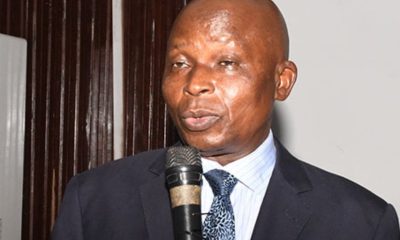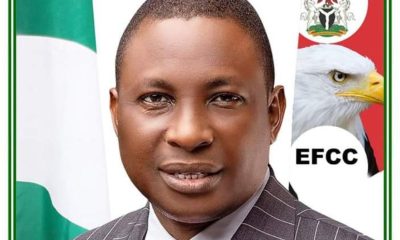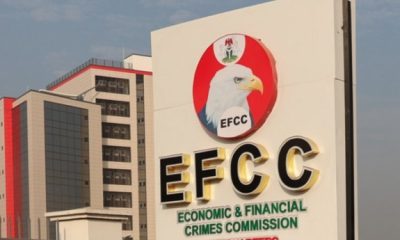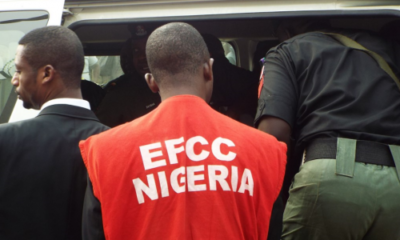National
Nigeria, South Africa reaffirm commitment to tackle economic, cybercimes

Nigeria and South Africa have reiterated their commitment to tackle the menace of cybercrimes, money laundering and other economic and financial crimes.
The Acting-Chairman of EFCC, Abdulkarim Chukkol, made this known on Wednesday in Abuja, when a senior delegation from the Directorate of Priority Crime Investigation (DPCI) of South Africa, led by Lt.-Gen. CS. Mosipi visited the commission.
Chukkol told the delegation that the EFCC was honoured to receive the delegation as a significant step “towards fostering a deeper understanding and collaboration between our esteemed agencies.
“The EFCC actually recognizes the track record and unwavering commitment demonstrated by your organization, the DPCI, most especially in prioritizing and combating serious crimes that threaten the fabric of our societies.
“As we all gather here today, united by our shared mission to safeguard our nations from the clutches of economic and financial crimes, we recognize the crucial role that knowledge exchange and cooperation play in strengthening our collective efforts.
“These challenges that we face are quite complex and multifaceted requiring a holistic and collaborative approach.”
Chukkol added that the EFCC placed a premium on cooperation and collaboration with law enforcement and anti-corruption agencies in Africa.
“So, collaboration with agencies like yours will go a long way in addressing some of the challenges we face in our continent.
“Through open and transparent sharing of intelligence, strategies and methodologies we can bolster our capabilities and enhance our resilience in the face of evolving criminal tactics,” he said.
On his part, Mosipi stated that the delegation was at the commission to develop new pathways in tackling economic and financial Crimes issues and other related offences bedeviling the society.
The leader of the delegation called for collaboration and cooperation between both agencies and the implementation of the existing law enforcement Memorandum of Understanding, MoU, between Nigeria and the Republic of South Africa.
“Within the DPCI we deal with serious economic and financial crimes; there is a section that deals with that and we equally deal with drugs, there is a section that deals with that.
“We are happy to be here and we hope that when we leave here we will have a way forward, we know exactly what we want to do and how we want to do it and we can from this table, get the capacity to deal with those things,” he said.
Headline
EFCC bars dollar transactions, orders embassies to charge in naira

The Economic and Financial Crimes Commission has barred foreign missions based in Nigeria from transacting in foreign currencies and mandated them to use Naira in their financial businesses.
The EFCC has also mandated Nigerian foreign missions domiciled abroad to accept Naira in their financial businesses.
The anti-graft agency said the move is to tackle the dollarisation of the Nigerian economy and the degradation of the naira
The Commission, therefore, asked the government to stop foreign missions in Nigeria from charging visa and other consular services in foreign denominations.
The EFCC gave the advisory in a letter to the Minister of Foreign Affairs, Amb. Yusuf Tuggar, for onward transmission to all foreign missions in the country.
In the letter, the EFCC said it issued the advisory because the practice of paying for consular services in dollars was in conflict with extant laws and financial regulations in Nigeria.
In a letter dated April 5, 2024, which was addressed to the Minister of Foreign Affairs, Ambassador Yusuf Tuggar, titled: “EFCC Advisory to Foreign Missions against Invoicing in US Dollar,” the EFCC Chairman, Ola Olukoyede expressed dismay over the invoicing of consular services in Nigeria by foreign missions in dollars.
The EFCC cited Section 20(1) of the Central Bank of Nigeria Act, 2007, which makes currencies issued by the apex bank the only legal tender in Nigeria.
The letter read, “I present to you the compliments of the Economic and Financial Crimes Commission, and wish to notify you about the commission’s observation, with dismay, regarding the unhealthy practice by some foreign missions to invoice consular services to Nigerians and other foreign nationals in the country in United States dollar ($).
“It states that ‘the currency notes issued by the Bank shall be the legal tender in Nigeria on their face value for the payment of any amount’.
“This presupposes that any transaction in currencies other than the naira anywhere in Nigeria contravenes the law and is, therefore, illegal.”
The commission further stated that the rejection of the naira for consular services in Nigeria by certain missions, along with non-compliance with foreign exchange regulations in determining service costs, is not just unlawful but also undermines the nation’s sovereignty embodied in its official currency.
The letter continues: “This trend can no longer be tolerated, especially in a volatile economic environment where the country’s macroeconomic policies are constantly under attack by all manner of state and non-state actors.
“In light of the above, you may wish to convey the commission’s displeasure to all missions in Nigeria and restate Nigeria’s desire for their operations not to conflict with extant laws and regulations in the country.”
Diplomatic sources said yesterday, May 10, that some embassies were wondering whether the EFCC’s advisory represented the position of the Federal Government.
Headline
Suspend cybersecurity levy– Reps to CBN

The House of Representatives on Thursday asked the Central Bank of Nigeria to withdraw the circular directing all banks to commence charging a 0.5 per cent cybersecurity levy on all electronic transactions within the country, The Nation reports.
The motion on the urgent need to halt and modify the implementation of the cybersecurity levy was moved by the member representing the Obio/Akpor Constituency, Kingsley Chinda.
The House urged the CBN to withdraw the circular and “issue a more understandable one,” as Chinda had drawn the attention of the House to multiple interpretations of the CBN directive against the specifications in the Cybersecurity Act.
-

 Headline2 days ago
Headline2 days agoSuspend cybersecurity levy– Reps to CBN
-

 Headline2 days ago
Headline2 days agoTinubu resumes work after foreign trip
-

 Business2 days ago
Business2 days agoNigeria needs over $2bn to revive Ajaokuta Steel Plant, says Minister
-

 Headline3 hours ago
Headline3 hours agoPrince Harry visits sick Nigerian soldiers in Kaduna
-

 News2 days ago
News2 days agoShan George’s money returned to Zenith Bank account
-

 Entertainment3 hours ago
Entertainment3 hours agoAMVCA Cultural Day: BBNaija’s Neo, Venita win Best Dressed Male, Female
-

 Metro3 hours ago
Metro3 hours agoEx-Sports Minister laments after hospital neglected him for hours over N80000 deposit














